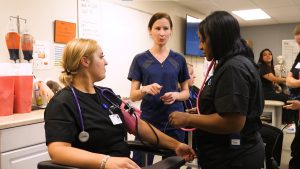5 Skills Medical Assisting Students Learn on their Externship
September 4, 2016

Medical Assistants play an incredibly important role in a healthcare team. Beyond what most people realize, Medical Assistants are especially skilled individuals with a truly large skill set. Likewise, Medical Assisting students also need cultivate broad skills, which is an important part of an externship.
The externship is a key ingredient in a medical assisting student’s education, which turns theoretical knowledge into practical experience. But there are some skills that you can only learn on the job.
Here are the top 5 Medical Assisting Skills that Students Learn on an Externship
1. How to Adapt
Being able to adapt to different environments and situations allows Medical Assistants to manage change effectively and efficiently work in teams. One minute, you might be dealing with a mother and her three sick kids, while next, you may be sterilizing equipment. Understand that it is all part of the overall job description, and show yourself to be willing.
2. How to be Observant
The externship is an ideal time to learn from people more experienced than you. Does the medical assistant you work with have a tip to make your work more productive? Do they know how to ask questions so that the patients give that little bit of extra information that might otherwise be missed? If you learn from these opportunities, you will start your medical assisting career from a strong position.
3. How to be Understanding
Medical Assistants use active listening, respect for their patients, patience, and open questions, like “tell me more about…”. By seeking to understand, medical assistants help the rest of the medical team, and the patients, as well. Developing an understanding attitude can also help to lower stress: your own, your patients’ and the rest of the medical team’s.
4. How to Be a Productive Team Member
Medical Assistants on externships have the benefit of bringing with them the most up-to-date techniques that they learned in school. So not only are you learning on the job, you might find yourself teaching, too. Either way, the job setting is where you learn the give-and-take of being a productive team member.
5. How to Earn Respect
Of course, the best way to get respect is to be adaptable, observant, understanding and a team player. But more than this, it’s displaying a positive, professional attitude, in your externship and beyond. Externships provide the experience that impresses employers, and if you show yourself able to learn on the job, your externship could turn into your first paid position after you graduate.
Does a Career in Medical Assisting Sound Interesting?
If you’d like a career where you help others and feel like you’re making a difference, then Medical Assisting could be right for you. Feel free to give us a call at 815-459-3500 and we’ll answer any questions you may have.
More on Medical Assisting:

